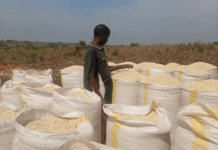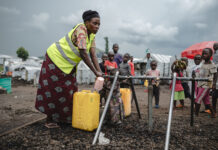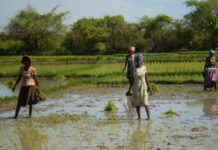Financial Inclusion in Cameroon : A Major Challenge
By Ayuk Takemeyang Aka | Afriqu54 Consultant
Cameroon is a Central African country with a population of approximately 25 million. Despite a growing economy, the country faces a major challenge in terms of financial inclusion.
According to a World bank study, only 15% of the adult population has access to formal financial services, such as bank accounts or credit cards. This situation has significant consequences on the daily lives of Cameroonians, particularly on their ability to save, invest and access credit to develop their economic activities.
The causes of financial exclusion in Cameroon are multiple. Firstly, the low-income level of the population is a barrier to access financial services. Indeed, traditional banks tend to focus on the most profitable clients, leaving out the poorest populations. In addition, the lack of financial infrastructure in rural and peri-urban areas makes access to financial services even more difficult for population far from urban centers and also the lack of relevant financial education makes matter worse.
In response to this challenge, several initiatives have been put in place to promote financial inclusion in Cameroon. Firstly, banks have started to develop financial products adapted to the needs of the poorest population, such as low-cost savings accounts or microcredits. In addition, information and communication technologies have enabled the emergence of new players in the financial system, such mobile payment services and fintech companies.It should be noted that digitalization of the banking and financial sector also has a growing influence in bringing about financial inclusion which cannot also be under estimated.
Despite these advances, financial inclusion remains a major challenge in Cameroon. To address this, it is necessary to continue efforts to develop financial products adapted to the needs of the poorest populations, while strengthening financial infrastructure in rural and peri-urban areas and ensuring the development of social capital and financial literacy. In addition, it is important to raise awareness among the population about the benefits of using formal financial services, particularly in terms of savings and investment.Financial institutions can conduct education periodically in order to help citizens understand various kinds of financial products and to avoid illegal financial products.
READ ALSO
- Addressing Gender Gaps In Cameroon To Enhance Inclusive Growth – By Ayuk Takemeyang Aka
- Financial Inclusion – Taking Banking Services to the Common Man in Cameroon
Also, collaboration between the government and financially literate people who have the skills required to ensure financial inclusion for individuals and every member of the country through wise financial decision-making is needed. collaborative intervention from multiple stakeholders is necessary to provide formal financial services to the excluded population and to bring the excluded population into the formal financial sector.
In conclusion, financial inclusion in Cameroon is a major challenge. Despite efforts to address it, there is still much to be done to enable the entire population especially the vulnerable to access formal financial services. However, ongoing initiatives show that solutions exist and that it is possible to meet this challenge to promote the economic and social development of the country.
By Ayuk Takemeyang Aka, Afrique54 & La Voix Des Décideurs Consultant
The Internationalist holds a Master’s degree in Banking and International Finance from the International Relations Institute of Cameroon, IRIC (University of Yaounde II) and is a Ph.D Fellow.












![[ PEOPLE ] Me Xavier François Menye Ondo, un exemple d’engagement humanitaire](https://www.afrique54.net/wp-content/uploads/2024/04/XAVIERR-218x150.jpg)












![Point de l’actualité à [ 21H00 GMT ]](https://www.afrique54.net/wp-content/uploads/2022/05/Point-Actu-De-ce-jour-Afrique54_net-e1690319635618-100x70.jpg)



